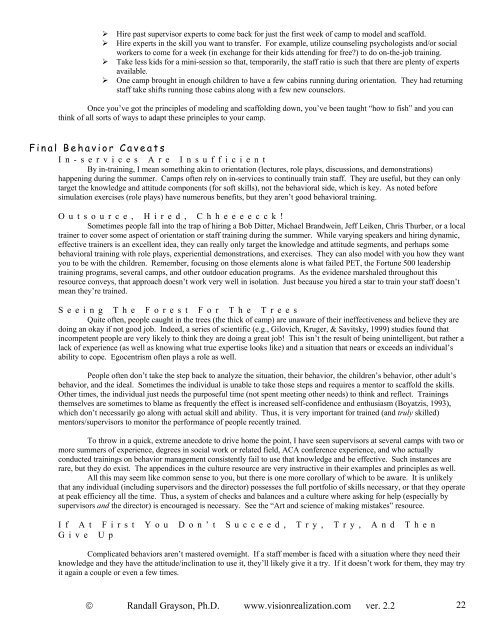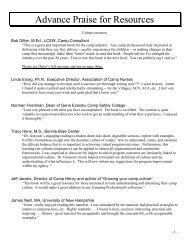Taking Camp Staff Training From Good To Best ... - Vision Realization
Taking Camp Staff Training From Good To Best ... - Vision Realization
Taking Camp Staff Training From Good To Best ... - Vision Realization
Create successful ePaper yourself
Turn your PDF publications into a flip-book with our unique Google optimized e-Paper software.
Hire past supervisor experts to come back for just the first week of camp to model and scaffold.<br />
Hire experts in the skill you want to transfer. For example, utilize counseling psychologists and/or social<br />
workers to come for a week (in exchange for their kids attending for free?) to do on-the-job training.<br />
Take less kids for a mini-session so that, temporarily, the staff ratio is such that there are plenty of experts<br />
available.<br />
One camp brought in enough children to have a few cabins running during orientation. They had returning<br />
staff take shifts running those cabins along with a few new counselors.<br />
Once you’ve got the principles of modeling and scaffolding down, you’ve been taught “how to fish” and you can<br />
think of all sorts of ways to adapt these principles to your camp.<br />
Final Behavior Caveats<br />
In-services Are Insufficient<br />
By in-training, I mean something akin to orientation (lectures, role plays, discussions, and demonstrations)<br />
happening during the summer. <strong>Camp</strong>s often rely on in-services to continually train staff. They are useful, but they can only<br />
target the knowledge and attitude components (for soft skills), not the behavioral side, which is key. As noted before<br />
simulation exercises (role plays) have numerous benefits, but they aren’t good behavioral training.<br />
Outsource, Hired, Chheeeecck!<br />
Sometimes people fall into the trap of hiring a Bob Ditter, Michael Brandwein, Jeff Leiken, Chris Thurber, or a local<br />
trainer to cover some aspect of orientation or staff training during the summer. While varying speakers and hiring dynamic,<br />
effective trainers is an excellent idea, they can really only target the knowledge and attitude segments, and perhaps some<br />
behavioral training with role plays, experiential demonstrations, and exercises. They can also model with you how they want<br />
you to be with the children. Remember, focusing on those elements alone is what failed PET, the Fortune 500 leadership<br />
training programs, several camps, and other outdoor education programs. As the evidence marshaled throughout this<br />
resource conveys, that approach doesn’t work very well in isolation. Just because you hired a star to train your staff doesn’t<br />
mean they’re trained.<br />
Seeing The Forest For The Trees<br />
Quite often, people caught in the trees (the thick of camp) are unaware of their ineffectiveness and believe they are<br />
doing an okay if not good job. Indeed, a series of scientific (e.g., Gilovich, Kruger, & Savitsky, 1999) studies found that<br />
incompetent people are very likely to think they are doing a great job! This isn’t the result of being unintelligent, but rather a<br />
lack of experience (as well as knowing what true expertise looks like) and a situation that nears or exceeds an individual’s<br />
ability to cope. Egocentrism often plays a role as well.<br />
People often don’t take the step back to analyze the situation, their behavior, the children’s behavior, other adult’s<br />
behavior, and the ideal. Sometimes the individual is unable to take those steps and requires a mentor to scaffold the skills.<br />
Other times, the individual just needs the purposeful time (not spent meeting other needs) to think and reflect. <strong>Training</strong>s<br />
themselves are sometimes to blame as frequently the effect is increased self-confidence and enthusiasm (Boyatzis, 1993),<br />
which don’t necessarily go along with actual skill and ability. Thus, it is very important for trained (and truly skilled)<br />
mentors/supervisors to monitor the performance of people recently trained.<br />
<strong>To</strong> throw in a quick, extreme anecdote to drive home the point, I have seen supervisors at several camps with two or<br />
more summers of experience, degrees in social work or related field, ACA conference experience, and who actually<br />
conducted trainings on behavior management consistently fail to use that knowledge and be effective. Such instances are<br />
rare, but they do exist. The appendices in the culture resource are very instructive in their examples and principles as well.<br />
All this may seem like common sense to you, but there is one more corollary of which to be aware. It is unlikely<br />
that any individual (including supervisors and the director) possesses the full portfolio of skills necessary, or that they operate<br />
at peak efficiency all the time. Thus, a system of checks and balances and a culture where asking for help (especially by<br />
supervisors and the director) is encouraged is necessary. See the “Art and science of making mistakes” resource.<br />
If At First You Don’t Succeed, Try, Try, And Then<br />
Give Up<br />
Complicated behaviors aren’t mastered overnight. If a staff member is faced with a situation where they need their<br />
knowledge and they have the attitude/inclination to use it, they’ll likely give it a try. If it doesn’t work for them, they may try<br />
it again a couple or even a few times.<br />
© Randall Grayson, Ph.D. www.visionrealization.com ver. 2.2 22





